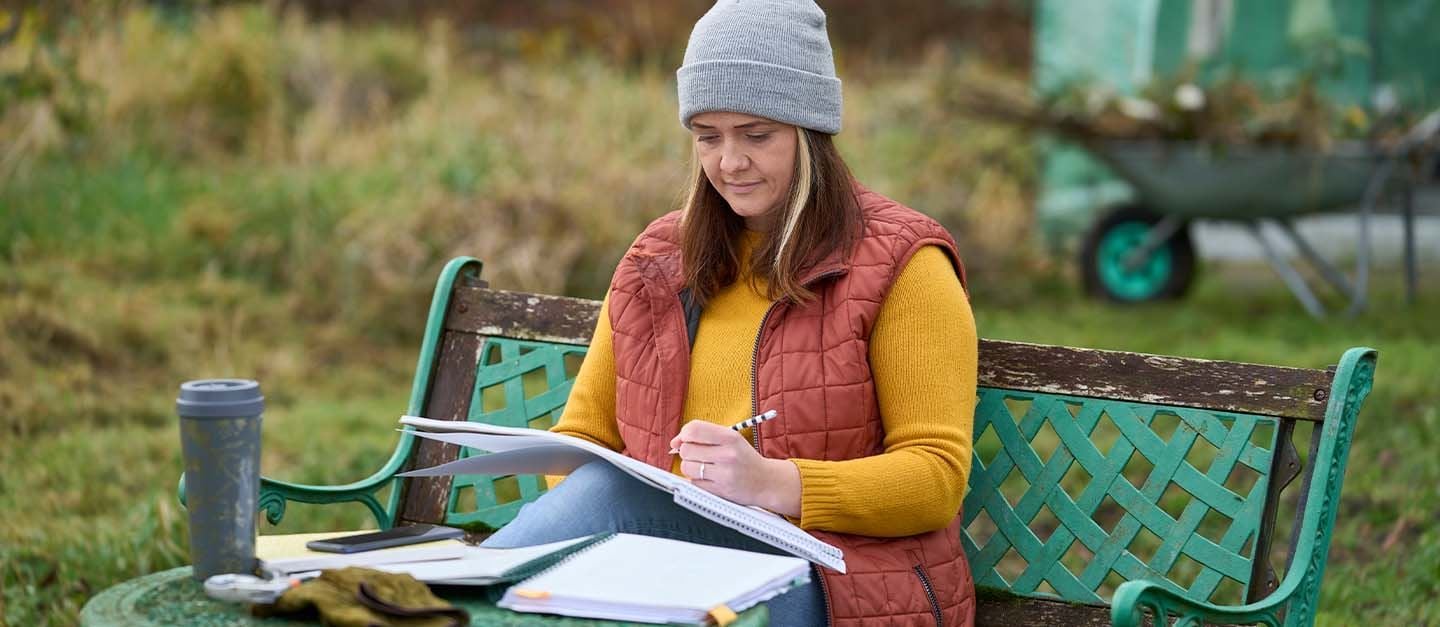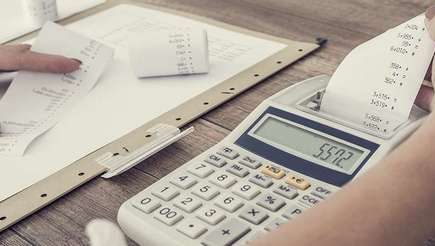If you're a self-employed gardener or landscaper, you might need to complete a Self-Assessment return and pay tax on the money you earn. However, there are several expenses you can claim against your income profit which will reduce the amount of tax you owe.
Claiming allowable expenses as a garden industry professional isn’t about avoiding paying tax, it’s about making sure you’re paying what’s fair. AXA’s easy guide explains the ins and outs of allowable expenses to help you understand what you can and can’t claim.
What are allowable expenses?
Allowable expenses are the tax-deductible, essential costs that keep your business running properly. As long as these costs were incurred specifically due to the running of your business, you won't have to pay tax on the money you've spent.
HMRC lets you subtract these costs from your business' profit, however, only certain things can be put down as an expense. So, having a clear understanding of your allowable expenses will ensure you're paying the right amount when submitting your self-assessment tax return at the end of the tax year.
It's important to understand what's allowed and what's not so that you don’t become an accidental tax avoidance target of HMRC. That's why it's a good idea to stay organised and keep a record of the invoices entering and leaving your business.
When it comes to claiming allowable expenses for your gardening business, there are a number of rules you should follow:
- You can only claim for the expenses you incur wholly and exclusively during the everyday running of your business.
- You can’t claim for expenses that have a dual purpose for business and personal use. For example, if you use your mobile phone for both business and personal use, you can only claim for the expenses related to the business use and will have to show reasonable calculations for this.
- Business expenses can be paid through your company’s bank account, or you can reclaim the costs of business expenses paid by you and later reimbursed via your business.
- You should maintain an accurate record of all your expenses and their receipts, so you can justify your actions if your business expenses claims are queried in the future.
What expenses can I claim as a Gardener or Landscaper?
Knowing what expenses you can claim to reduce your tax bill can be tricky. However, HMRC has published guidance for self-employed workers which we’ve summarised in this easy and garden industry specific guide to allowable expenses.
Gardening Tools & Equipment
For smaller tools and equipment such as spades, shovels, and watering cans you'll be able to claim these as allowable expenses since they're necessary for you to carry out gardening work. You should also be able to claim for repairing or replacing tools as they wear out and for renting or leasing larger equipment.
If you decide to buy larger equipment such as a lawn mower or, if you're doing bigger landscaping jobs and need a backhoe or front loader, then you may need to list these as capital allowances rather than allowable expenses. You should consult an accountant if you're unsure of whether or not a large purchase will count as an allowable expense or if it should be listed in a different way on your balance sheet.
Work & Safety Clothing
While everyday clothing or even business clothing such as suits cannot be claimed as an allowable expense, work and safety clothing can. This means expenses on steel-toe capped boots, on gloves, eyewear and noise protectors would all count as allowable expenses as they're protective clothes needed to complete the job. Clothing that could be part of an 'everyday wardrobe' will not be covered by HMRC so don't try to claim things that aren't specifically for work.
Typically, branded clothing with your company logo on it will not be included as an allowable expense though you could try to include it as an advertising cost. HMRC may push back on that depending on what the branded clothing is because it may still be possible to categorise it as 'everyday wardrobe'.
Insurance
All of your business insurance policies can be covered as an allowable expense. As a gardener or landscaper, you'll likely want to have public liability insurance. Public liability insurance will help protect your business against damage and the cost of legal claims people make against you, if you’ve done something that’s resulted in injury to a member of the public or damage to their property. While it's not a requirement, public liability insurance it’s a demonstrable sign of the legitimacy of your business, can help your offering appear more respectable and may even help you secure new business in future.
As a gardener or landscaper, you may spend a lot of time on the road, moving your tools between each client's garden. It's important that your van is covered so that business can continue to run smoothly, so you should have van insurance as well. Van insurance can cover damage to your van and damage to others as the result of an accident, as well as broken windows and windscreens, personal belongings, mis-fuelling and medical expenses.
While these are two types of insurance you're most likely to have when working in the garden maintenance and design industry, any other type of business insurance that you have can be counted as an allowable expense as well.
Office Items
It's unlikely that you'll be claiming a lot on office items as a gardener considering your work largely takes place outdoors and at other people's homes, however you are able to claim for any office items you do use such as a business phone, postage or stationery.
If you regularly conduct business from your own home, you can claim a portion of your electricity, broadband and other bills as an allowable expense but you'll need to work out what proportion of this is used for home and what proportion is used for work.
Vehicles
In addition to your van insurance, there’s several other allowable expenses that you can claim which are related to business vehicle usage. This can include business travel and mileage, parking fees, fuel, repairs and maintenance as long as all of those costs are incurred for the purpose of doing business.
If you get any fines or tickets while driving, please be aware that you will not be able to claim any allowable expenses on these.
To make your book keeping easier, you may be able to calculate your van expenses using a flat rate (known as simplified expenses) for mileage instead of the actual costs of buying and running your vehicle. This won’t be as precise and you may miss out on some savings, but the process is a lot more streamlined.
Advertising fees
If you spend money on flyers that you’ll deliver door to door or hang in local gardening centres or cafes, you’ll be able to claim back that expense. Anything from advertising online to placing signage at the properties of existing clients could be claimed as an allowable expense.
If you’re struggling to think of great marketing tactics for finding new clients, check out our How to Become a Gardener article for some ideas.
Professional subscriptions and memberships
In order to keep on top of the latest gardening trends and the best tips for preventing pests, you may want to subscribe to trade magazines or journals. As long as these are related to your area of work, you’ll be able to claim them as business expenses. Joining professional bodes can have many benefits such as making your business seem trustworthy to clients, so it’s good to know that membership to any professional trade body or organization in your industry can be claimed as an allowable expense as well.
Finances
Certain expenses related to your business finances can be claimed against expenses as well such as bank charges for opening and maintaining a business or interest on loans for starting the business. If keeping track of all these allowable expenses is intimidating for you, you can even claim back taxes for the costs spent on hiring an accountant to help you.
Disallowable Expenses (Don't Claim These)
While a lot of your expenses can be covered under allowable expenses, unfortunately there are some things that definitely can’t be claimed. While this list isn’t exhaustive, here’s a few things you won’t be able to list as an allowable expense and will still have to pay the taxes on:
- Parking fines and penalties
- Tax penalties and late payment interest
- Lunch, unless in special circumstances
- Training for new gardening skills – you can expense training for improving existing skills though, so this is a fine line!
- Client entertainment
- Everyday clothing or business suits
- Your pension costs
- Your salary
- Your Life insurance
How do I claim allowable expenses
In order to claim your expenses, add up all of your allowable expenses for the tax year and put the total amount on your Self Assessment Tax Return. Sound easy enough, but you may not want to wait until doing your tax return to go through all your expenses.
To stay organised, set aside a specific time each week to make a note of the business expenses that you're liable to receive tax relief for – you may want to get familiar with spreadsheets as a way of tracking everything. By doing a bit of admin every week, it keeps claiming allowable expenses from being a daunting task during tax season. It also ensures that your expenses are more accurate because you’re taking notes as you go along when everything is fresh in your mind.
Keeping accurate records is vital as you could be fined by HMRC for submitting incorrect information. You don’t need to include proof at this stage, but you need to keep the correct records and produce them if asked by the HMRC.
After you log the expenses in your spreadsheet, you’ll want to file and keep the physical and digital copies of receipts for every purchase you make whether it’s business mileage, fuel costs, equipment, or another type of business expense. HMRC dictates that receipts must be kept for six years after you've filed your tax return and can ask to see them at any point within these six years.
Nobody wants to pay more tax than they have to, which is why keeping your business as tax efficient as possible could help you save a pretty penny. Remember, the golden rule when it comes to working out what allowable expenses you can claim for your business: they must be incurred wholly, exclusively and be necessary for the running of your business.
If you're finding the process of working out what allowable expenses your business can and can't claim, get in touch with an accountant for advice to make sure everything is above board.






